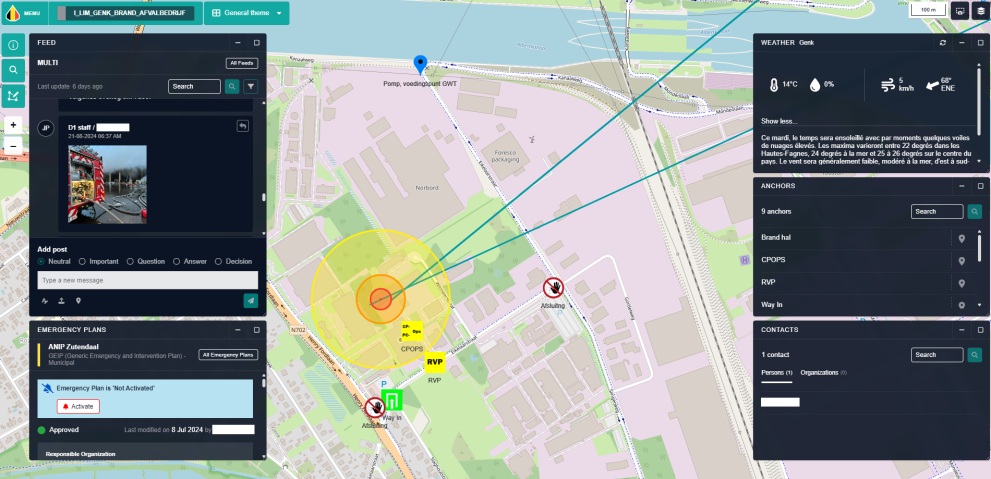
Discover the new Technical Assistance projects for Disaster Risk Management
New projects have kicked off under the umbrella of the Technical Assistance for Disaster Risk Management (Track 1) call for proposals from 2024.
Coordinators of the 12 selected projects met with DG ECHO in Brussels on Tuesday, 18 March 2025. The meeting provided an overview of the framework for grant implementation and an opportunity for networking among disaster risk management authorities' representatives from 11 UCPM countries.
Technical assistance for disaster risk management (Track 1)
Technical Assistance for Disaster Risk Management (Track 1) provides financial support to national disaster risk management authorities for strategic activities such as feasibility studies, proposals, policies, and plans. These activities aim to strengthen capacities and leverage investments for improved disaster risk management outcomes. In 2024, the budget was EUR 5.4 million. From 21 proposals submitted (requesting EUR 8 million), 12 projects received funding.
| The new call for proposals is currently open. Details can be found on the Funding & Tenders portal and the Knowledge Network platform. Interested parties can also access an information session about Technical Assistance for Disaster Risk Management. |
All funded projects share the goal of strengthening disaster management services. The selected projects have been grouped into three thematic areas:
Data, Information management and risk analysis
3IDRM (Germany): Aims to improve understanding of disasters by consolidating damage and loss data from major events in Germany over the past 20 years. It will pool official, open, and participatory sources and establish recommendations on empowering vulnerable groups within national disaster risk management.
DLD-LV-2 (Latvia): Will finalise preparations for Latvia’s national disaster damage and loss database by drafting a comprehensive roadmap and updating technical specifications for database implementation.
WEDS (Czech Republic): will enhance understanding of wildfire risk factors and vulnerabilities in the Czech Republic. It will strengthen collaboration among stakeholders involved in wildfire risk management and analyse existing wildfire early detection technologies, potentially leading to the development of such a system.
SMarAI (Spain): will develop an operational platform using artificial intelligence to enhance maritime safety intervention capabilities during disasters at sea, optimising resource allocation through risk estimation and analysis, real-time forecasting and mapping.
The SCENEX-B project will provide us with useful tools to continue supporting public authorities in their preparedness planning and more general resilience-building efforts for years to come.
Preparedness, coordination and crisis management
SCENEX-B (Denmark): Will develop a scenario- and exercise bank to strengthen capabilities in scenario-building, support preparedness exercises, and enhance cross-sectoral coordination of preparedness planning.
RESIL-POL (Poland): Aims to enhance societal resilience in Poland by developing strategies in crisis management communication, improving inter-institutional cooperation, building a hazards knowledge base, and delivering relevant training.
I-SIVAC (France): Will improve the Interministerial Information System for Victims of Attacks and Disasters (SIVAC tool), providing ministries and crisis response stakeholders with enhanced functionalities, to identify, monitor and support victims as well as their relatives, during and following the major crises.
SCOR-DRM (Romania): Aims to enhance response capacities within Romania’s Department for Emergency Situations by harmonising procedures and aligning practices with disaster risk management legislation.
PPM MNE (Montenegro): Will develop priority prevention and preparedness measures to strengthen the overall capacity of Montenegro’s institutions and society in addressing diverse disaster scenarios.
The project will contribute to improving crisis management capabilities and institutional cooperation in the region, serving as a crucial element in building societal resilience against contemporary threats.
Public awareness, education and community preparedness
THEMIS (Greece): Will develop comprehensive guidelines for awareness-raising campaigns aimed at educating and preparing the tourism sector for effective disaster risk management. The project focuses on improving visitor safety, particularly for vulnerable groups, through increased awareness, preparedness, and response capabilities.
VOLCAN (Spain): will enhance preparedness, reaction and resilience of local communities and authorities to volcanic eruptions. Drawing on lessons from the 2021 the La Palma eruption, it will develop new risk reduction policies, public awareness raising activities and training programmes for disaster risk management.
INVEST for DRM (Croatia): Aims to enhance Croatia’s civil protection system by improving effectiveness in disaster prevention and preparedness, emphasising resilience through green transition and innovative technologies.

Further information
More details about all funded projects are available on the Knowledge Network platform’s project pages.